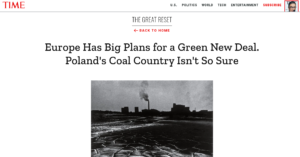https://time.com/collection/great-reset/5900740/europe-green-new-deal-poland/
Europe Has Big Plans for a Green New Deal. Poland’s Coal Country Isn’t So Sure
By BY JUSTIN WORLAND – OCTOBER 22, 2020
Time Mag:
Excerpt: But since the very beginning, tensions have existed between richer and poorer countries in the union over everything from fiscal policy to defense and migration. The need to respond to climate change is no different, especially as it’s the poorer, largely Central and Eastern European nations whose economies depend more on heavy-polluting industry.
The Green Deal was born out of all those challenges. A new economy, European leaders hope, will lead to a revived and more integrated Continent. “The European Green Deal is Europe’s new growth strategy,” said von der Leyen before she presented the program in December. “It will cut emissions while also creating jobs and improving our quality of life.”
At first, Poland rejected the plan’s ambitions. President Andrzej Duda had promised to save the coal industry and its jobs—part of a controversial populist appeal to national identity and heritage. “As long as I am the President,” he said in 2018, “I won’t allow for anyone to murder Polish mining.” For months, Duda’s government opposed the bloc’s 2050 carbon-neutrality target, the only E.U. country to do so.
Then the coronavirus pandemic hit. Rather than slow down the process, leaders in Brussels saw an opportunity to expedite their plans. The E.U. Commission—the bloc’s executive body—promised to pour hundreds of billions of euros into the economy in response to the virus and the subsequent lockdowns that halted economies across the Continent. A quarter of the €750 billion recovery plan would be directed toward low-carbon investments; the remainder of the funds came with a “do no harm” provision, meaning the investment shouldn’t be used on projects that harm the environment. And, to keep up the momentum, E.U. leadership promised to spend that proportion of the bloc’s budget on green measures over the next seven years.
Polish leaders in Warsaw faced a conundrum: the government remained rhetorically committed to coal, but the economics had become increasingly difficult. Until the coronavirus plunged the world into global recession, Poland had experienced three decades of sustained economic expansion. But the country would need to rethink its economy to return to growth. As electricity demand plummeted, caused by the pandemic and subsequent lockdowns, coal mines shuttered with difficult economic headwinds anticipated ahead even when the pandemic eases. And leaders in Brussels demanded that the country commit to net zero to be eligible for all of its allocated money under the Just Transition program.
So, slowly, Poland changed its tone. In late July, after months of foot dragging, Polish leaders signed on to the package. The deal would allow Poland to receive half of its allocated Just Transition money even if it didn’t commit to eliminating its carbon footprint. Polish Prime Minister Mateusz Morawiecki hailed it as a victory: “We won,” he said. But it was also a major concession to the E.U.: Poland accepted that it would lose out on billions of euros unless it quickly changed course.
With that money on the line, the pressure has only grown. In September, the country achieved a break-through when it committed to close its mines by 2049, and suggested a willingness to consider the bigger promise to green its economy—with the right conditions. “We are not saying it’s impossible, but we are saying let’s make sure we all exactly know how it’s going to happen,” says Kurtyka, the Climate Minister. “We cannot say in the office in Brussels or in Warsaw: ‘That will be the objective,’ and move on.”




